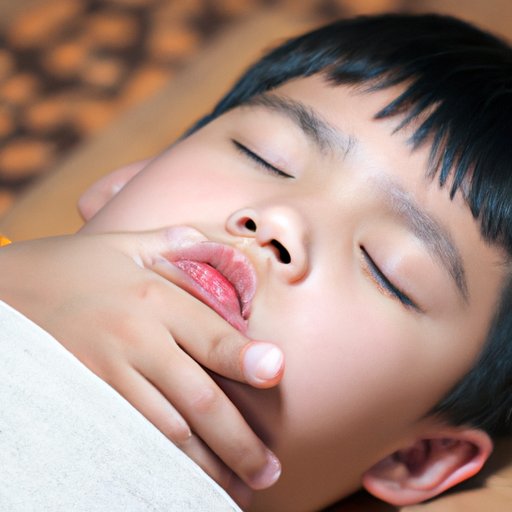
Introduction
Drooling is one of the most common problems people have while sleeping. It’s not a serious issue, but it can cause some discomfort and embarrassment. It is a biological process often beyond our control, but there are remedies and solutions available to address the situation. This article aims to provide various strategies that you can try to stop drooling while you sleep.
Top 5 Remedies to Stop Drooling in Your Sleep
Here are some popular remedies that have been found to be effective:
1. Change Your Sleeping Position
One of the reasons why you drool in your sleep is due to your sleeping position. Sleeping on your stomach can cause you to drool profusely. Try to sleep on your side or on your back instead. This will help you reduce your drooling.
2. Make Use of Pillows
Using pillows can also help you manage drooling in your sleep. You can try putting a pillow under your chin to help prevent the flow of saliva. You can also try elevating your head with a pillow, which helps to prevent the production of excess saliva.
3. Reduce Your Stress Levels
Stress and anxiety can affect how much you drool while you sleep. Practicing relaxation techniques such as meditation or yoga can help you reduce your stress levels, ultimately leading to less drooling while you sleep.
4. Professional Treatment
If you have chronic drooling issues, you may want to visit a doctor to have your condition assessed. A doctor may suggest using Botox injections to block the salivary glands from producing excess saliva.
5. Use of Antihistamines
Drooling may also be an indication of allergies or sinus conditions. In such cases, you can try using antihistamines. Antihistamines can help to reduce allergy symptoms and also dry up your nasal passages, hence, reducing drooling.
It is possible to use a combination of these remedies to manage drooling while you sleep, and see which solution works best for you.
Causes of Drooling in Your Sleep and How to Stop It
Medical Problems
Drooling can occur as a symptom of a medical condition. There are several neurological, respiratory, and gastrointestinal health issues that can cause drooling. For example, people who suffer from Parkinson’s disease, cerebral palsy, or multiple sclerosis also experience issues with excess drooling. For these cases, it is essential to visit your doctor to identify the root cause and get the necessary treatment.
Sleeping Habits
Another factor that can cause drooling in your sleep is your sleeping habits. Sleeping on your stomach, for example, has been found to be a significant cause of drooling. Drinking alcohol and eating before sleeping can also cause excess saliva production, leading to drooling in your sleep. One easy solution is to avoid eating before bedtime and switch your sleeping position to prevent drooling.
Eastern Remedies to Stop Drooling
Eastern traditional medicine has also provided several remedies that can be effective in helping with drooling in your sleep. Here are some of them:
Acupuncture
Acupuncture therapy aims to balance the flow of energy, also known as Qi, in the body. It involves the insertion of needles into specific points on the body to regulate the body’s functions and promote healing. Acupuncture can help regulate saliva flow in the body and has been found effective in stopping drooling in your sleep.
Acupressure
Acupressure therapy is a therapy that involves applying pressure to specific points on the body to promote relaxation, improve blood circulation, and reduce muscle tension. It can help to stimulate the body’s self-healing power, including controlling drooling in your sleep.
Herbs and Natural Treatments
Eastern medicine also encourages the use of natural remedies such as herbal teas and essential oils. Some herbs, including cloves, fennel, and ginger, have been found to help regulate saliva flow, hence, reducing drooling while you sleep. Essential oils such as lavender oil have a calming effect that could reduce stress levels, leading to less drooling.
How to Stop Drooling during Your Sleep Naturally
Here are some natural remedies for managing drooling:
Herbal Remedies
Using specific herbs such as arnica and passionflower can help reduce drooling in your sleep. Arnica can help to dry up the mouth and reduce saliva production, while passionflower has a calming effect on the brain, leading to less drooling while you sleep.
Essential Oils
Essential oils such as peppermint oil can help regulate saliva production and reduce drooling in your sleep. Peppermint oil is known for its cooling effect, which has been found helpful in reducing excessive saliva production and drooling.
Mouth and Throat Exercises to Stop Drooling in Your Sleep
Here are some simple throat and mouth exercises you can try:
Jaw Exercise
Gently open and close your jaw with your tongue pressed on the roof of your mouth. This exercise helps to strengthen the jaw muscles, as well as the mouth tissue, eventually preventing drooling.
Tongue Exercise
Stick your tongue out as far as possible and keep it in that position for a few seconds before pulling it back in. This exercise helps to improve tongue strength, hence, preventing drooling.
Chewing Exercise
Chew a piece of gum or a chewy snack to help strengthen the muscles in your mouth, which helps to prevent drooling while you sleep. This exercise can also help to reduce stress levels, leading to less drooling.
Conclusion
Drooling in your sleep can be a frustrating situation that can affect your self-esteem and quality of life. The good news is that there are numerous remedies, both natural and medical, that can help you manage this problem effectively. By trying out the different techniques and remedies outlined in this article, you can find the best solution to help you stop drooling in your sleep.





